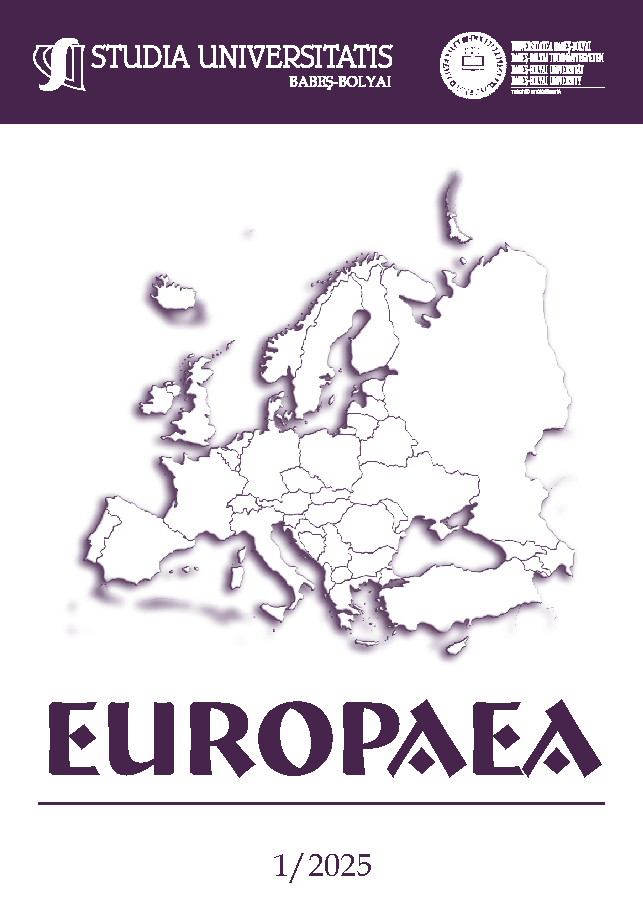Cantopop Renewed: Identity Politics in Post-2019 Hong Kong and the Rise of Mirror
DOI:
https://doi.org/10.24193/subbeuropaea.2025.1.06Keywords:
Hong Kong, Local Identity, Mirror, Cantopop, Hybridization, DepoliticizationAbstract
Post-2019, Hong Kong has witnessed an increased interest in Cantopop. While the genre peaked in the 1980s and 1990s, pop music sung in the local language became popular again, as seen in the rise of the band Mirror. As political upheaval after the protests restricts political expression through selective depoliticization, this paper argues that the resurgence of Cantopop is indicative of a growing interest in local expression and the protection of local identity. By interviewing ten Hongkongers, the paper argues that Mirror’s success lies at the intersection of local identity, consumer culture, and pan-East-Asian cultural trends.
References
1. “Cantopop: the glorious years” (2022), ChinaDaily, https://epaper.chinadaily.com.cn/a/202206/17/WS62abe3b9a3109375516eceff.html.
2. “Cantopop: Why Hong Kong is seeking solace in local music” (2022), BBC, https://www.bbc.com/news/world-asia-china-60735794.
3. Chu, Yiu-Wai; Leung, Eve (2013), “Remapping Hong Kong Popular Music: Covers, Localisation and the Waning Hybridity of Cantopop.” Popular Music, vol. 32, no. 1, 65-78.
4. Faye, Bradley (2023), “Equal music”, China Daily, https://www.chinadailyhk.com/article/353837.
5. Fosler-Lussier, Danielle (2020), “Music and Media in the Service of the State.” Music on the Move, University of Michigan Press, 120-148.
6. Goehr, Lydia (1994), “Political Music and the Politics of Music.” The Journal of Aesthetics and Art Criticism, vol. 52, no. 1, 99-112.
7. Green, Lucy (1988), Music on Deaf Ears: Musical Meaning, Ideology and Education, Manchester: University Press
8. “Hong Kong Mirror fans’ excessive admiration: alarming signs of escalating spending raise concern” (2023), DimsumDaily, https://www.dimsumdaily.hk/hong-kong-mirror-fans-excessive-admiration-alarming-signs-of-escalating-spending-raise-concern/.
9. Ho, Wai-Chung (2003), “Between Globalisation and Localisation: A Study of Hong Kong Popular Music.” Popular Music, vol. 22, no. 2, 143-157.
10. Hui, Mary (2021), “Never give up:” A Hong Kong boy band has emerged as the voice of a city under crackdown”, Quartz, https://qz.com/2010206/hong-kong-boyband-mirror-is-the-voice-of-a-city-under-crackdown.
11. “Mirror: all you need to know about the Hong Kong Canto-pop boy band, and how they compare with BTS” (2022), South China Morning Post, https://www.scmp.com/yp/discover/entertainment/article/3187266/mirror-all-you-need-know-about-hong-kong-canto-pop-boy.
12. Ngok, Ma (2011), “Value Changes and Legitimacy Crisis in Post-Industrial Hong Kong.” Asian Survey, vol. 51, no. 4, 683-712.
13. Ortiz, Fernando (1947), Cuban Counterpoint: Tobacco and Sugar, tr. Harriet de Onis (Durham, NC: Duke University Press, 1995), 102-103
14. Parry, Hazel (2013), “Hong Kong kids need to learn self-care skills”, South China Morning Post, https://web.archive.org/web/20220115085917/https://www.scmp.com/lifestyle/family-education/article/1231489/hong-kong-kids-need-learn-self-care-skills.
15. Shan, Lo Yin et al. (2019), “‘Performativity’ in the Age of Banality.” Boredom, Shanzhai, and Digitisation in the Time of Creative China, ed. Jeroen de Kloet et al., Amsterdam University Press, 139-146.
16. ”The Mirror phenomenon: Why this boy band is a uniquely Hong Kong sensation” (2023), DimsumDaily, https://www.dimsumdaily.hk/the-mirror-phenomenon-why-this-boy-band-is-a-uniquely-hong-kong-sensation/.
17. “We Can’t Write the Truth Anymore” (2024), Human Rights Watch, https://www.hrw.org/report/2024/09/24/we-cant-write-truth-anymore/academic-freedom-hong-kong-under-national-security-0.
18. Yang, Hon-Lun (2017), “Music, China, and the West: A Musical-Theoretical Introduction.” China and the West: Music, Representation, and Reception, edited by Hon-Lun Yang and Michael Saffle, University of Michigan Press, 1-18.
19. Ye, Peggy; Ihara, Kensaku (2024), “Hong Kong boy band Mirror reflects city's identity in mainland shadow”, Nikkei Asia, https://asia.nikkei.com/Business/Media-Entertainment/Hong-Kong-boy-band-Mirror-reflects-city-s-identity-in-mainland-shadow.
Downloads
Published
How to Cite
Issue
Section
License
Copyright (c) 2025 Studia Universitatis Babeș-Bolyai Studia Europaea

This work is licensed under a Creative Commons Attribution-NonCommercial-NoDerivatives 4.0 International License.



